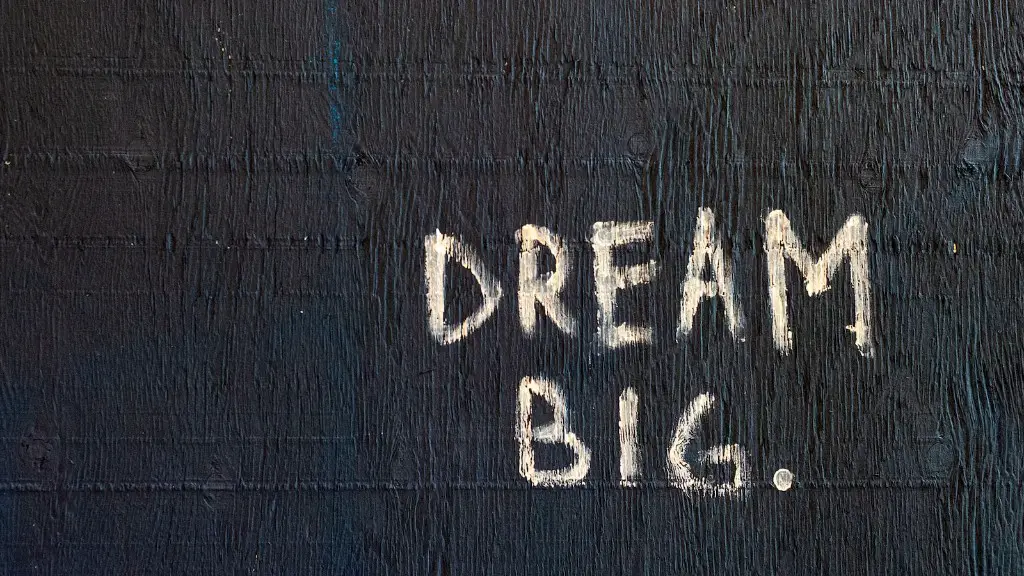Dreams are a universal experience that have been a part of humanity for as long as we can remember. They are a way for our subconscious to process information and sort through memories. Dreams can be bizarre, wonderful, or terrifying, but they are always intriguing. Even though we all dream, we don’t always remember our dreams. And when we do, they don’t always make sense. But that doesn’t stop us from wondering what they mean.
Dreams are unclear, symbolic representations of our hopes, fears, and desires. They help us process the events of our waking lives and sort through our emotions. Dreams are not reality, but they can feel very real.
What do your dreams actually mean?
It’s generally accepted that dreams represent a collection of thoughts, struggles, emotions, events, people, places and symbols that are relevant to the dreamer in some way. However, there is no definitive evidence about what dreams actually consist of. Dreams could be a way for our brains to process information and sort through memories, or they could be a way to release pent-up emotions. They could be a mix of both, or something entirely different. Regardless of what dreams actually are, they can be a powerful tool for self-reflection and growth.
Most people dream every night during REM sleep, though they may not remember all of their dreams. There are five main types of dreams: normal dreams, daydreams, lucid dreams, false awakening dreams, and nightmares.
Normal dreams are the most common type of dream and usually occur during REM sleep. They are often random and nonsensical, but can sometimes be based on real life events or be symbolic.
Daydreams are similar to normal dreams, but are usually less vivid and more controlled by the person daydreaming. They often occur when a person is bored or daydreaming.
Lucid dreams are when a person is aware that they are dreaming and can often control the dream. They are more common in children and young adults.
False awakening dreams are when a person dreams that they have awoken, but in reality, they are still dreaming. This can be a very confusing and disorienting experience.
Nightmares are the most unpleasant type of dream and usually involve fear, anxiety, or other negative emotions. They can be caused by stress or other psychological factors.
How can I find out what a dream means
There are many ways to interpret the meaning of dreams. One method is to look at the objects, people, and locations in the dream and consider what they mean to you. Another approach is to think about the emotions the dream sparked. If the dream was particularly vivid or memorable, it may be worth looking into what it could mean.
Most dreaming occurs during REM (rapid eye movement) sleep, which we cycle through periodically during the night. Sleep studies show our brainwaves are almost as active during REM cycles as they are when we’re awake. Experts believe the brainstem generates REM sleep and the forebrain generates dreams.
Do dreams tell the truth?
People tend to think that dreams reveal hidden emotions and beliefs and they often find them to be more meaningful than thoughts they might have when they are awake. Morewedge tells WebMD that people don’t attribute equal meaning to all dreams, however. Dreams may be more likely to be interpreted as having personal significance when they are vivid and bizarre, when they contain characters that the dreamer knows, and when the dreamer has a high need for self-understanding.
When you dream about someone, it is usually a reflection of how you feel about them in your waking life. Your dream may be telling you to pay attention to that person in your waking life. Your subconscious may be trying to connect the dots on something and needs your conscious mind to help them figure it out.
What happens if we see death in dream?
Although dreams of someone dying can cause fear and anxiety, it is important not to take them too literally. Dreams often symbolize the end of one thing and the beginning of another. In this case, the dream may be signifying the end of a phase in your life and the start of a new one. Pay attention to the emotions you feel during the dream and try to connect them to events in your life. With some reflection, you should be able to see how the dream is connected to your current situation.
The length of a dream can vary; they may last for a few seconds, or approximately 20–30 minutes. People are more likely to remember the dream if they are awakened during the REM phase.
What are the rarest dream
Most experts believe that lucid dreams are the rarest type of dreams. While dreaming, you are conscious that you are dreaming but you keep on dreaming. According to researchers, 55 percent of people experience these types of dreams at least one time in their life.
Dreams are a critical aspect of ourselves that can provide insight into our recent state of mind, future possibilities, and changes that we have experienced. Scientists and psychologists, old and new, have found that dreams can offer important clues about our overall well-being and mental health. Dreams can be a helpful tool in exploring our thoughts and emotions, and can help us to make necessary changes in our lives.
Can a dream tell the future?
Although there is little scientific evidence to suggest that dreams can predict the future, some research indicates that certain types of dreams may help predict the onset of illness or mental decline. Much more research is needed in this area to determine the full extent of dreaming’s predictive abilities.
Dreams are powerful tools for self-reflection and growth. They can help you to identify what you really know and feel about a certain subject, and can guide you towards what you need to do in order to achieve growth, integration and expression. Additionally, dreams can also be useful in helping you to understand and resolve any unfinished business you may have.
Does dreaming mean good sleep
Dreaming is a normal, healthy part of sleep. Dreams have been connected to better cognitive function and emotional health, and studies have also linked them to effective thinking, memory, and emotional processing.
If you want to eliminate bad dreams, you should try to set a regular sleep schedule and cut out caffeine, alcohol, and cigarettes (especially late in the day). You should also exercise during the day, but don’t work out right before going to bed. Finally, you should try to relax before falling asleep.
Should I listen to my dreams?
Paying attention to your dreams can provide rich insights into the issues that are playing on your mind. Dreams are the brain’s way of working on important issues, problems or emotions that are leftover from when we’re awake. By paying attention to our dreams, we can gain a better understanding of what’s going on in our subconscious mind and what we need to work on in our waking life.
Dreams are interesting because they are processed in the same brain as our regular senses. This is why dreams can feel so real, even though they may be irrational. Our rational brain only kicks in when we are fully awake, which is why dreams can seem like anything could happen.
Why do I dream of my ex
If you find yourself dreaming about an ex, it’s possible that you’re recalling past trauma in your relationship. Research shows that stressful emotions and trauma during waking hours can impact your dreams. Trauma can also come from the death of a partner or loved one. Dreaming about a deceased partner can be a tool for managing grief.
It’s possible that the person you are dreaming about is thinking about you, but it’s also possible that they are just a frequent presence in your thoughts. If you find yourself dreaming about the same person over and over again, it may just be a sign that you have been thinking about them a lot lately.
Warp Up
The dictionary defines a dream as “a series of thoughts, images, and sensations occurring in a person’s mind during sleep.” Dreams can be sparked by anything from our daily lives and experiences to outside stimuli, such as what we see or hear just before we go to sleep.
There is no consensus on what dreams actually are, but there are many theories. One theory is that dreams are a way for our brains to process information and sort through memories. Another theory is that dreams are a way to work through our anxieties and fears. Some people believe that dreams are a way to connect with a higher power or our subconscious mind. Whatever the case may be, dreams are definitely fascinating and worth exploring further.





